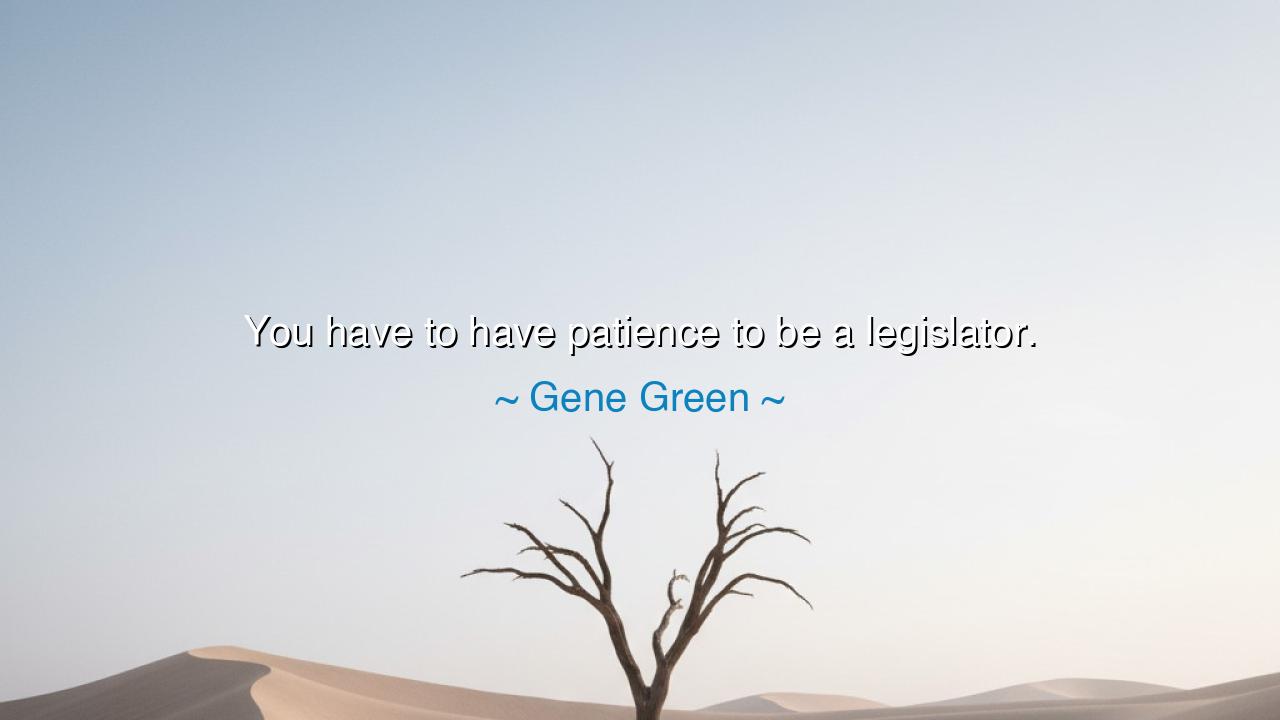
You have to have patience to be a legislator.






Hear the words of Gene Green: “You have to have patience to be a legislator.” Though simple in phrasing, these words carry the weight of centuries. For to be a legislator—one who shapes the laws of the people—is not to wield the sword in haste, nor to command swift victories, but to endure the long and wearisome work of negotiation, compromise, and slow progress. The affairs of a nation are like the turning of a mighty river: they cannot be forced by a single hand but must be guided gently, steadily, until the waters follow the chosen path.
The ancient councils knew this truth well. In the Roman Senate, debates often stretched for days, tempers flared, alliances shifted, yet laws emerged only through endurance. Cicero himself, master of eloquence, warned that the republic could only be preserved if those who governed bore the burden of time and resisted the temptation of rash decrees. Patience was the armor of the statesman, for without it, anger and impulse would destroy the fragile balance of the commonwealth.
To be a legislator is to accept the truth that not all battles are won swiftly. The voices of many must be heard, the fears of the people must be calmed, the interests of factions must be weighed. This is not weakness—it is the very strength of democracy. For the laws of the land cannot be hammered out in haste; they must be forged slowly in the furnace of debate, shaped by the blows of disagreement, and tempered by time until they can withstand the storms of history. Without patience, the law becomes brittle, and the nation suffers.
History offers us examples of those who failed in this virtue. In the days of the French Revolution, fiery voices demanded instant change, instant justice, instant transformation. Yet their haste led not to freedom but to the guillotine, where thousands perished under the tyranny of impatience. Contrast this with the long, deliberate debates of the American founders, who argued, quarreled, and delayed, yet through their patience produced a Constitution that has endured centuries. The difference between ruin and resilience was the willingness to endure time’s trials.
Yet Green’s words are not only for senators and statesmen—they are for all who seek to lead, to guide, to shape the lives of others. In every sphere of governance—whether of nations, of communities, or even of families—the same truth holds: without patience, authority collapses into tyranny or chaos. The wise leader learns to wait, to listen, to understand that victory is not always swift conquest, but often slow cultivation, like the farmer tending fields until the harvest comes.
The lesson is clear. If you would be a legislator of any kind—if you would shape your world with justice and vision—you must first cultivate patience. Do not despise delay, for it teaches endurance. Do not curse disagreement, for it sharpens wisdom. Do not seek the path of speed, for it often leads to ruin. Instead, embrace the long road, and trust that the slow victories are the ones that last.
Practical wisdom follows. In your own life, when confronted with conflict, do not rush to impose your will. Listen, endure, weigh carefully, and move steadily. In your work, resist the temptation to demand instant results, and instead build foundations that endure. In your communities, value dialogue over domination, persuasion over force. For to govern wisely—even if only in small matters—is to walk the path of the legislator, and this path is paved with patience.
Thus, let Gene Green’s words be remembered: to govern is to wait, to endure, to persist. The rash may rise swiftly but fall just as quickly; only the patient will build legacies that endure the centuries. And so I say to you: if you would shape laws, lives, or legacies, clothe yourself in patience, for it is the first and last virtue of the true legislator.






AAdministratorAdministrator
Welcome, honored guests. Please leave a comment, we will respond soon